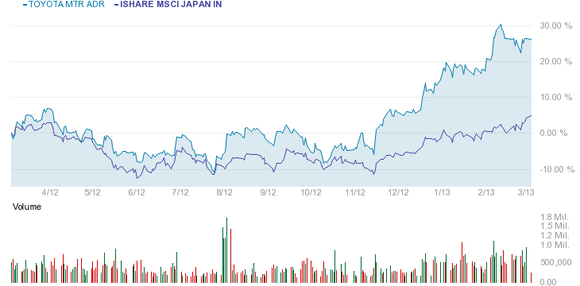Currency exchange rates play an important role in the success or failure of businesses that conduct major operations in foreign markets. Having a basic understanding of a few key principles can give investors a significant advantage in the market. Given highly predictable inflationary conditions, let’s discuss how you can make money by investing in individual exporters.
Dollars & Sense
Recently, the world has been focused on the Euro vs. the U.S dollar, as the battle between austerity and Federal Reserve intervention plays out. However, a recent twist came from Japan, which issued a bold declaration to inflate the Yen. This deliberate attempt to weaken the Japanese currency will ultimately trump the Euro vs. dollar battle in the race to the bottom.

Let’s take the example of the U.S. dollar and the Japanese yen. To purchase Japanese goods, an American would need to convert dollars to yen. If more yen hits the market (supply increases) the price (value) decreases. This means that over time, you would receive more yen for the same amount of dollars.
The goal of this deliberate inflation policy is to make Japanese goods less expensive in overseas markets, by giving foreign currencies increased purchasing power from the new exchange rates. Ideally, this will raise the amount of Japanese goods sold overseas (exports) and stimulates the economy.
In the last six months, we have seen the dollar go from purchasing approximately 78 yen to 94. This represents nearly 20% increased purchasing power for Americans buying Japanese goods.
Foolish Results?
The policy of a weaker Yen appears to be working, with January export numbers for Japan showing a 6.4% increase.
While this can have some beneficial effects, there are also well-documented negative impacts from this type of artificial stimulus.
First, it makes imports cost more. As new product cycles begin, increasing prices for imported materials will hurt Japanese companies’ margins. Japanese consumers will also find imported products more expensive, diminishing their own purchasing power.
Finally, since Japan runs a trade deficit ($17.4 billion U.S. dollars), largely because of increasing energy imports, a weaker yen could hurt the overall economy in the long run. The trade deficit would suggest that continued weakening would be an unwise long term policy, which might cut short Japan’s short-term experiment in weakening the yen.
Fast and Furious
However, one of the main industries to see an immediate positive impact from these Japanese monetary policies will be the Japanese auto manufacturers.
Toyota Motor Corporation (ADR) (NYSE:TM) is the nation’s leading exporter. While it does business in many countries, Toyota Motor Corporation (ADR) (NYSE:TM)’s bottom line is greatly affected by fluctuations in relation to both the Euro and the U.S. Dollar.
Over the last six months, the purchasing power of the U.S dollar is up almost 20% vs the yen. Meanwhile, the Euro has seen a nearly 25% gain vs the yen. That means consumers in these markets pay less for a Japanese-made Toyota Motor Corporation (ADR) (NYSE:TM). This lower price will increase demand, and consequently drive greater exports from Japan to these markets.
Looking at a 52-week chart of the Japanese ETF iShares MSCI Japan Index vs. Toyota Motor Corporation (ADR) (NYSE:TM) (Figure 1), it appears that the two were trading in tandem until news broke of the new currency policy.
Figure 1:

The divergence that has occurred after that announcement is due to the fact that Toyota is largely export-based, while the ETF includes non-export oriented companies which will not stand to benefit as much.


